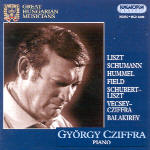Collectors may know some of these performances from an earlier APR release devoted to pianist György Cziffra’s Hungarian recordings from the early to mid 1950s, made prior to his association with EMI. Several items from these sessions, though, have not previously circulated on CD to my knowledge, including Liszt’s Waldesrauschen and Cziffra’s transcription of Vecsey’s Valse Triste. Few if any interpretive or technical differences exist between the material on this reissue and Cziffra’s EMI remakes from the late ’50s. Perhaps I find the earlier “Flight of the Bumblebee” transcription more demonically dispatched than the EMI version, but either way I can’t help but be amazed by Cziffra’s mind-blowing interlocking octaves. The later Balakirev Islamey, though, is slightly more supple and light-fingered, but not by any significant degree. Cziffra’s own, glittery Rumanian Gypsy Fantasia fares equally well here and on EMI. As usual with Cziffra, fingertwisting Liszt selections like Gnomenreignen and Grand Galop Chromatique abound in sudden dynamic surges and passagework that’s deliberately rushed in order make listeners sit at the edge of their seats. Yet the pianist also can make points in a straightforward manner, as demonstrated in the crisply delineated and stylish Schumann Traumeswirren and in the Hummel and Field E-flat Rondos.
Cziffra treats both Liszt’s Valse Impromptu and First Valse Oubliée in a caressing, lilting, fashion. Although I prefer the breadth and more ample sonority of the present Waldesrauschen compared to the pianist’s glibber 1970 studio recording, his right-hand filigree occasionally overpowers the left-hand melodic material. And the same holds true throughout much of Les jeux d’eau à la Villa d’Este. No question, however, that the present rendition of Soirées de Vienne No. 6 (after Schubert) is deliciously deliberate and misty-eyed, in marked contrast to the pianist’s tired, disinterested EMI remake from the mid-’80s. As for Cziffra’s madcap overhauling of Khachaturian’s Sabre Dance, it’s about as subtle as an elephant stampede. Then again, what else do you expect from circus-act pianism?
































